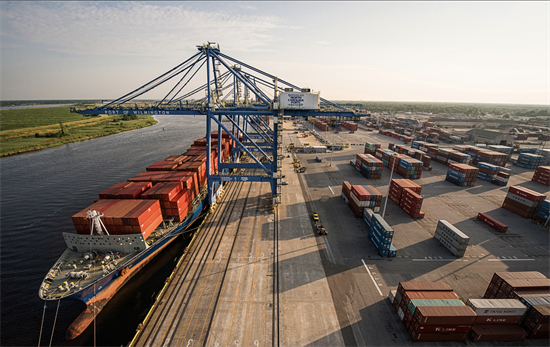Press Releases
Rouzer Champions Permitting Reform Legislation to Improve U.S. Port Operations
Washington,
March 12, 2024
WASHINGTON, DC - Today, Congressman David Rouzer (R-NC-07) and Congresswoman Mary Peltola (D-AK-AL) introduced the bipartisan Permitting Optimization for Responsible Transportation (PORT) Act to streamline permitting and materials regulations for maritime transportation, clearing a path to build and modernize ports and harbors. H.R. 7587, the PORT Act, streamlines permitting reviews under the United States Maritime Administration (MARAD) by broadening their covered Categorical Exclusions to maintain certainty for regulated entities involved in improving U.S. port infrastructure. “Supply chain challenges resulting from the COVID-19 pandemic as well as current disruptions in the Red Sea demonstrate just how critical it is to have reliable and efficient U.S. ports," said Rep. Rouzer. "The PORT Act makes commonsense permitting reforms to help U.S. ports build the infrastructure necessary to keep goods moving and prices down. I'm proud to introduce this bipartisan legislation to ensure our ports can confront the challenges of today’s global economy.” In February, during a Coast Guard and Maritime Transportation Subcommittee hearing examining the threats to shipping in the Red Sea, Congressman Rouzer questioned witnesses on how Congress can best prepare for congestion issues at U.S. ports. In response, witnesses suggested investing in land-side infrastructure to strengthen U.S. capacity to handle future supply and demand surges caused by external factors. “There are many barriers to building ports in Alaska: high material costs, short building season, dangerous sea ice… but unnecessary permitting bureaucracy shouldn’t be one,” said Representative Mary Peltola. “Alaskans pay the highest grocery prices in the country due to high shipping costs–modernized ports decrease costs and increase efficiency. The PORT Act will get Alaskans into union jobs and shovels into the ground, just by simplifying regulations. I’m proud to introduce and sponsor this legislation and excited to work alongside Congressman Rouzer to get it passed in a bipartisan manner.” "It should not take longer to permit a federally funded infrastructure project than it does to actually build it," stated Cary Davis, American Association of Port Authorities (AAPA) President and CEO. "Permitting rules and red tape are better for regulatory lawyers than for everyday Americans. The PORT Act would make faster returns on investments in our critical infrastructure and the industry expresses sincere gratitude to Representatives Peltola and Rouzer for leading this crucial legislation." “The Permitting Optimization for Responsible Transportation (PORT) Act will streamline the important and valuable permitting process and provide ports with the necessary tools to effectively manage Port Infrastructure Development Program grants effectively from start to finish. With this legislation, the North Carolina State Ports Authority will be able to better and more efficiently manage its growing federal grant portfolio, including the recently announced PIDP award that will modernize the Port of Wilmington’s North Gate. We appreciate Rep. Rouzer’s support and leadership in this important process,” said Brian Clark, Executive Director, North Carolina State Ports Authority As Chairman of the Water Resources and Environment Subcommittee, Rouzer has championed efforts to reduce red tape and deliver on permitting reform. He helped lead the effort to overturn the Biden Administration’s overreaching WOTUS rule. Rouzer secured permitting reform contributions in H.R. 1 to ensure America can build the energy infrastructure necessary to responsibly utilize our natural resources. Earlier this Congress, he relaunched the bipartisan Congressional Supply Chain Caucus to collaborate on ways policymakers can alleviate permitting disruptions resulting in large-scale delays and economic loss. The PORT Act would:
|


